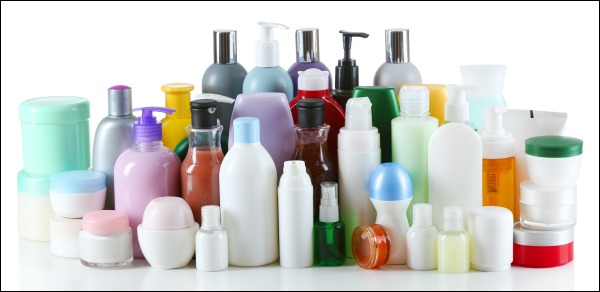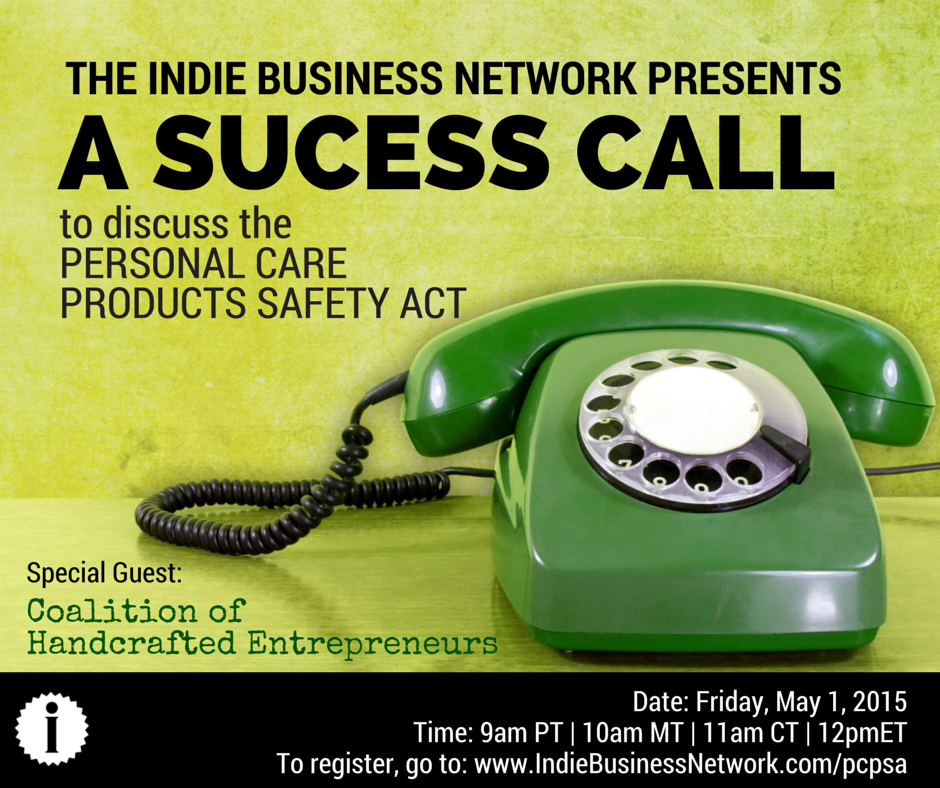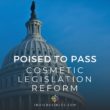Senators Dianne Feinstein (D-CA) and Susan Collins (R-ME) have introduced S-1014: Personal Care Products Safety Act of 2015. You can read it here. This piece of legislation is the latest in a string of proposed cosmetics laws that have been introduced and/or circulated on Capitol Hill since 2008, but which have either never been referred to committee, or died while in committee. While the bill is just days old, it is already drawing criticism from small business advocates.

This post provides a very high level overview of some of the provisions in the bill with a focus on how it may impact members of the Indie Business Network who make soaps and cosmetics. This is a bill, not a law. It has been introduced and will now proceed through the legislative process.
Success Call: Friday, May 1, 2015, at 12pm ET
I will host a Success Call for members of the Indie Business Network at 12pm ET on Friday, May 1, and my special guest will be Anne-Marie Faiola, head of the Coalition of Handcrafted Entrepreneurs, and her lobbying team.
Because of the importance of this issue, if you are not a member of IBN, you can register to attend the Success Call at this link. Feel free to share that information with your friends who are not members so they can have access to this important information.
(If you are an IBN member, you will receive the call information by email and as a post in our Secret Facebook Forum. Don't forget to mark your calendar and check the forum and email for that. If you are not a member, you can join here.)
Click the image below to register for the Success Call if you are not a member of the Indie Business Network.
High Level Overview of the Personal Care Products Safety Act of 2015
This post will be supplemented as I continue to read (and re-read) the provisions, and as the bill makes its way through the legislative process. This is a summary. It is not a substitute for you reading the bill yourself. You can do that here.
Here is an overview.
- Registration and fees: The proposed law requires that companies that manufacture, process, pack, or hold cosmetic products or cosmetic formulations register with the FDA, and pay an annual fee. (Currently, registration is voluntary under the Voluntary Cosmetics Registration Program, and there are no fees.)
Companies with less than $100,000 in gross domestic sales over the preceding three years are exempt from fees and registration. Companies with less than $500,000 in gross domestic sales over the preceding three years must register but are exempt from fees. Companies grossing between $500,000 and $2.5 Million will pay an annual fee of $250.
- Ingredient Review: Under the bill, the FDA would be required to establish a Cosmetics Safety Advisory Committee to advise the FDA of ingredients that need to be considered for safety review. Additionally, the FDA is to complete a safety review of and report on at least 5 cosmetic ingredients per year.
- Good Manufacturing Practices: The bill codifies and requires Good Manufacutring Practices. At present, while the manufacturing practices used by all manufacturers must produce safe products, the exact practices that must be employed are not specified. Instead, they appear in the form of guidelines. If passed in its current form, the new law would require the FDA to promulgate mandatory good manufacturing practices, and make specific practices a part of the regulations.
- Serious adverse events reporting: The bill requires the reporting of serious adverse events within 15 days of receiving information concerning an adverse event. “Adverse events” are those resulting in death, a life threatening experience, inpatient hospitalization, a persistent or significant disability or incapacity, congenital anomaly or birth defect, or significant disfigurement, including serious and persistent rashes and infections.
- Labeling: The proposed law gives the FDA the authority to require specific labeling of products that include ingredients not appropriate for children and those that should be for Professional Use Only. Internet websites offering cosmetics for sale shall provide the same information required on the packaging of the cosmetics, and any required the warnings are to be prominently displayed online as well as on the product packaging.
Product labels must contain the domestic telephone or electronic contact information consumers can use to report adverse events.
- Records inspection and recall authority: The bill gives the FDA authority to inspect manufacturers' records and request request the voluntary recall of personal care products deemed to threaten consumer safety. The recall can be made mandatory if a voluntary recall by the manufacturer is not forthcoming. In such case, the bill contains provisions for due process and hearings.
- Preemption: The bill specifically preempts states from enacting cosmetics legislation in the areas of registration, GMP, recalls, or adverse event reporting. Any existing state laws are not affected by this provision as it does not appear to apply retroactively.
This is a high level overview of some of the main portions of the bill, and is not to meant to substitute for a good read of the bill. In fact, I will continue to read and re-read it over the next few weeks as I also follow the bill's progress. I will share updates as things change and move forward.
What Now?
As noted above, IBN is hosting a Success Call to discuss the new legislation at 12pm ET on Friday, May 1, 2015, and to help members gain a fuller understanding of the provisions and what actions they can take to positively affect the legislation process where this bill is concerned.
If you are a member of the Indie Business Network, the call information will be provided for you via email and via our exclusive Facebook Forum.
If you are not a member, please register for the call at this link.
At this time, the Indie Business Network has not taken a position on the bill.
Here are links to some organizations and advocacy groups that have taken a position on the legislation:
In an April 20, 2015 press release, the Independent Cosmetic Manufacturers and Distributors (ICMAD) said that the bill “places too large a burden on small business, stifles innovation in the cosmetics and personal care industry, and does not provide appropriate and significant national uniformity.” At this time, you can download the press release on their home page.
The Personal Care Products Council released a statement supporting the bill on April 20, and you can read it here.
The Handmade Cosmetic Alliance released a statement saying that the bill “jeopardizes small businesses, jobs, and entrepreneurial opportunities.”
The Environmental Working Group, not surprisingly, supports the legislation. Here is a link to their announcement, calling the bill “a path forward.”
The Coalition of Handcrafted Entrepreneurs released a statement on the bill, but did not take a position for or against it.
QUESTION: How do you think passage of a bill like this would affect your business? Share your feedback in the comments below.




